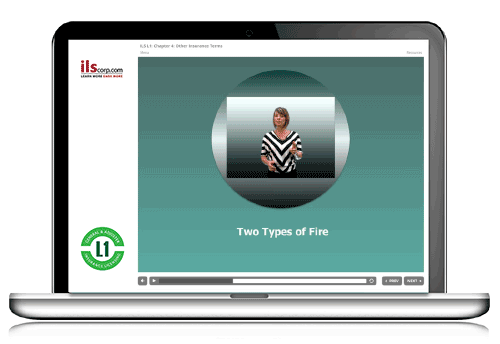View the video demo of the ILS Level 1 General Insurance Licensing Program and test your knowledge by taking the quiz.
The ILS Level 1 Licensing program has everything you need in one package to successfully pass your Level 1 General Insurance Licensing exam.
Still not sure if this program is the right choice for you?
View the CHAPTER 1 Video Demo and see what taking an online course is all about.
VIDEO DEMO ILS L1
The video demo is a sample of Chapter 1 of the L1 program – INTRODUCTION TO GENERAL INSURANCE
CHAPTER ONE CONTENT SAMPLE – Insurance is all about risk sharing. It’s not a new idea having been around for thousands of years. Risk sharing is a way of helping to ensure that a loss does not spell financial ruin for a person or business. It involves coming up with ways to accomplish that. Before the days of insurance companies, people came up with ways the community would share individual risks.
EXAMPLE 1: Back in the days of the caveman, when a hunter was killed in the hunt, his widow and family were supported by the other hunters.
EXAMPLE 2: The Yangtze River in China is a treacherous waterway and early traders travelling the river had their work cut out for them. Rather than take their entire trading goods over the many rapids on their own, they would meet at a sheltered area of the river and place a portion of their cargo in each of the many boats gathered there. This way, if one boat failed to negotiate the rapids safely, every boat owner still had some of their goods in the other boats. No one faced the prospect of losing everything and having to start their business over again. That’s what insurance does – it’s all about risk sharing.
Today, insurance companies take money from thousands of people and, for all practical purposes, keep that money in a pool from which to pay losses. The basic concept hasn’t changed – each contributor’s money is used to pay the losses of the few in their group who will have them. Basically, insurance is a mechanism for sharing the losses of the few among the many.
RISK AND RISK MANAGEMENT OPTIONS
Point 1: Definition of Risk: “Risk is the chance of financial loss as a result of loss or damage to the object of insurance or some other happening.” As individuals, we don’t know whether we will have a loss or not but we know that we will be worse off financially if we do. Everyone is exposed to risk in daily life, including:
Personal risk – the risk of dying, becoming seriously ill, disabled, or unemployed.
Property risk – the risk of loss or damage to property owned, rented or leased.
Liability risk – the risk of being held financially responsible for bodily injury or property damage caused to others.
People or organizations that have these kinds of risk face the potential for financial loss.
Point 2: There are two kinds of risk:
Speculative Risk: provides people with the chance to either make a profit or a loss.
Insurance is not intended for speculative risks. There is no insurance company willing to provide insurance for bankruptcy or loss of money from gambling.
EXAMPLE: Making the decision to go into business is a speculative risk. You either are successful or, as a worst-case scenario, you go bankrupt. Gambling is another example of a speculative risk. At the end of the day, you have either won money or lost money.
Pure Risk: provides only the potential for financial loss with no chance of gain or profit.
Insurance is provided for pure risks only. In other words, insurance can be purchased only for risks that have the potential for financial loss and no chance of financial gain. As we have seen, the purpose of insurance is to attempt to put the insured person back in the same position he or she was in immediately prior to the loss.
EXAMPLE : Owners of property will suffer financial loss when their property is lost or damaged. If there is no loss to their property, they do not gain or profit – their situation remains unchanged. Business owners can also be sued when their negligence causes bodily injury to another person or results in damage to that person’s property. If they are fortunate enough to carry on their business without being sued, they do not profit from that – their situation remains unchanged. There is no chance of profit or financial gain in these situations. Pure risk provides the chance only for financial loss.
CHAPTER 1
INTRODUCTION TO GENERAL INSURANCE
1. Insurance – The Basic Idea: Risk Sharing.
2. Risk and Risk Management Options
3. Definition of Insurance
4. Functions of Insurance
5. Types of Insurance Companies – Legal Form
6. Internal Organization of Insurance Companies
7. How Insurance is Distributed
This is just a quick sample of the ILS Level 1 General Insurance Licensing Program, to learn more about the program click here.




